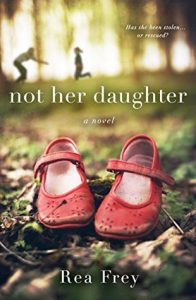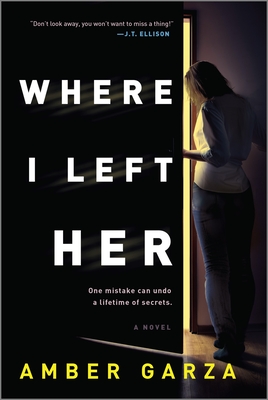 Sarah’s mother resented her existence, never failing to make her aware of the obstacle she is in life of a woman who believes she gave up fame to be a mother. So she may have been primed for kidnapping a little girl whose mother treated her in a similar manner. After a month on the run with the child, with all that entails—lying to friends and family, shifting work priorities, constant fear—Sarah’s conscience shifts. Coincidentally, her own mother contacts her after a lifetime of absenteeism.
Sarah’s mother resented her existence, never failing to make her aware of the obstacle she is in life of a woman who believes she gave up fame to be a mother. So she may have been primed for kidnapping a little girl whose mother treated her in a similar manner. After a month on the run with the child, with all that entails—lying to friends and family, shifting work priorities, constant fear—Sarah’s conscience shifts. Coincidentally, her own mother contacts her after a lifetime of absenteeism.
As though laying out with tweezers the contents of her life, Frey carefully portrays a mother who never wanted to be a mother in a way that even the most hardhearted reader can squeeze out a bit of sympathy for her. Confused, overwrought, overweight (the character focuses on this fact about herself excessively), she’s suspected of murdering her own child on circumstantial evidence she can’t refute. The fact that the mother wishes to improve herself redeems her, if only just. The child, however, seems way too well-adjusted and mentally healthy for the childhood she was enduring when she was taken. There was no groundwork laid to show her easy ability to make friends or readily accept changes not easily understood by small children. Even severely abused children cry for their mothers, and this one reached for hers after the mother’s hateful words of not loving her, so that completely assimilating into a new life, even a more positive one, so quickly seems to be less than credible. Furthermore, after the surprising turn of events at the climax, the father’s character inexplicably fades away.
This novel raises the question of who we really are to ourselves, as Sarah repeatedly states that she is not a kidnapper, though that is exactly what she is. It also points out the challenges of a legal system that cannot, for practical purposes, factor in emotional abuse of children in removing them from the home, though this seems irrelevant here. It seems unlikely that Montessori school officials would not have notified authorities regarding the bruises that covered the child’s arms and legs. Such obvious signs of physical abuse countered Sarah’s sense of morality. Without that aspect of the mother’s bad parenting, this story would have made more sense.
I was fortunate to receive an early copy from the publisher through NetGalley.

 Emerson, Georgia, and Marley meet at fat camp, quickly establishing lifelong friendships. Their weight reflects backgrounds of abuse, neglect, and unrealistic expectations, leading to self-sabotage. One friend’s tragedy spurs the others toward their authentic selves.
Emerson, Georgia, and Marley meet at fat camp, quickly establishing lifelong friendships. Their weight reflects backgrounds of abuse, neglect, and unrealistic expectations, leading to self-sabotage. One friend’s tragedy spurs the others toward their authentic selves. Sarah’s mother resented her existence, never failing to make her aware of the obstacle she is in life of a woman who believes she gave up fame to be a mother. So she may have been primed for kidnapping a little girl whose mother treated her in a similar manner. After a month on the run with the child, with all that entails—lying to friends and family, shifting work priorities, constant fear—Sarah’s conscience shifts. Coincidentally, her own mother contacts her after a lifetime of absenteeism.
Sarah’s mother resented her existence, never failing to make her aware of the obstacle she is in life of a woman who believes she gave up fame to be a mother. So she may have been primed for kidnapping a little girl whose mother treated her in a similar manner. After a month on the run with the child, with all that entails—lying to friends and family, shifting work priorities, constant fear—Sarah’s conscience shifts. Coincidentally, her own mother contacts her after a lifetime of absenteeism.